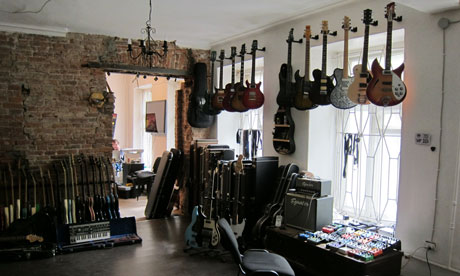
In stately St Petersburg, down the block from the Hermitage's Winter Palace, 450-odd miles from where Pussy Riot are standing trial, 86 hard-working nobodies are turning their rented mansion into an anarchist utopia. This is Taiga: a "creative space" that hosts, among other things, a gallery, bike shop, radio station, hostel, photo laboratory, recording studio, English-language school, architecture firm, cafe, designer and vintage clothing stores, as well as Russia's largest electric guitar showroom. They also have a ping-pong table.
Taiga is one of several places in St Petersburg where young (and some not so young) people are trying to disrupt Russia's "greedy" zeitgeist, agitating not for full political upheaval but for kindness and hard work.
"People today think you can buy everything," says Taiga's Daria Kachavina. "They think you don't have to be a good person – someone who can help, who can be kind ... If you have money, you can do whatever you want. But young people are tired of this. It's not true."
Mark Kalinin, a graphic designer, found this space in early 2011: it was dilapidated and crumbling, and the owner offered to rent it at a reduced rate if the tenants took charge of everything, from door hinges to plumbing. Just a year later, dozens have joined Taiga, across 30 organisations – and all of them, without exception, pitch in. Pooling time and money, they have painted, swept, built new walls and floors, threaded cable, assembled chandeliers. The result is a labyrinth of faded opulence, with whitewashed walls, exposed wood and lots of sunlight.
"We really wanted to show that you can make everything with your own hands," says Alina Selezneva, who runs Taiga's tiny bookshop. "The lazy people, the people who don't want to help each other or egotistical people – this isn't the place for them."
Taiga's work ethic, all plaster-dust and silkscreen, stands in stark contrast to the works of Dasha Zhukova, the best-known doyenne of Russian contemporary art. Whereas Zhukova and her partner, billionaire Roman Abramovich, hustled at least £250m for their proposed cultural centre on the city's New Holland island, Taiga's stakeholders just get on with it: when I visit, Taiga's chief photographer is building a roof. Kachavina hurries away to prepare the exhibition hall for a lecture on Dutch book design. It all feels so far away from the Lucian Freuds and bulletproof cars of Zhukova's "New Russia". In fact, I remark to Selezneva, it feels a little socialist. She laughs. "We joke about that. We were kids when communism fell, so maybe it's in our dreams somewhere."
This collectivism isn't so apparent in Taiga's peers. A red-bricked former factory called Tkachi, billed as a "creative space", feels decidedly corporate: despite the rough-hewn aesthetic, it's basically an anaemic hipster shopping centre. Etagi, Russia's oldest loft project, is much more of a jewel: founded in 2007, this gallery/hostel/cafe is a sanctuary from St Petersburg's bustle, with a magnificent terrace and delicious, affordable food. (Try the manti dumplings or "Bird's Milk", a chocolate cake filled with homemade marshmallow.) Etagi also hosts concerts, programmes for children and abandoned pets, plus exhibitions such as that of World Press Photos and a permanent installation of Sumo, Helmut Newton's 30kg art book.
Yet one thing is conspicuously absent from all of these arts spaces: protest. As thousands clamour against Putin, with candlelight demos for Pussy Riot's punk-rock martyrs, Taiga and Etagi both emphasise their neutrality. Their members may march in the streets, standing vigil in rainbow balaclavas, but no one wants to jeopardise these fragile institutions. Politics is too dangerous.
"Art spaces are not very open to political artists," admits Tania Volkova, a Moscow-based art historian and activist. "The tendency of self-censorship [began] several years ago when big art centres started to cancel exhibitions on political art. Now this tendency is becoming stronger."
At least in Taiga's case, their days are already numbered. As soon as the building's owner finds a buyer, these industrious dreamers will be out on the street."We know this is a short period – two years or something," Selezneva says. Their utopia is temporary. "But it became very special because we made it ourself."
• Taiga Space (Dvortsovaya nab. 20, space-taiga.org) is open every day, but its shops and services keep different hours: check the website for details. Tkachi (Obvodny Canal 60) is open 11am-9pm. Loft Space Etagi (Ligovsky prospekt 74) is open weekdays noon-10pm, weekends 10am-10pm. Hostel dorm rooms start at 500 rubles (around £10), with private rooms available from £20. British Airways (ba.com) flies from Heathrow to St Petersburg from around £280 return

